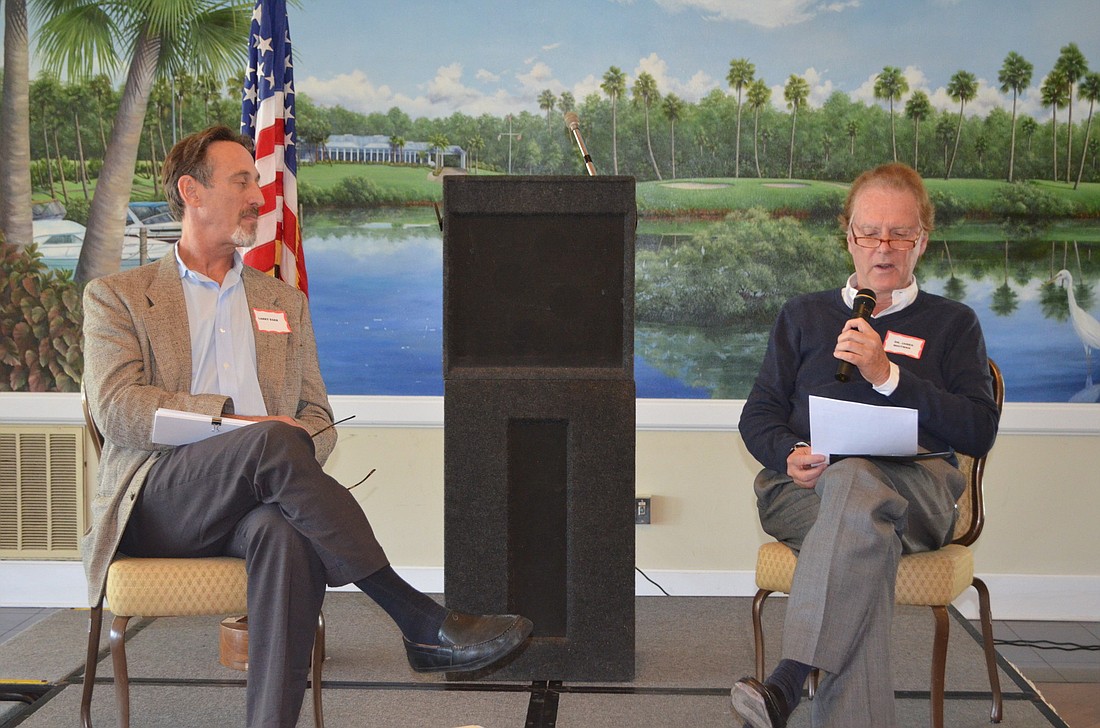- July 26, 2024
-
-
Loading

Loading

Both Dr. Jim Whitman and Larry Eger believe the question of medical marijuana is a public health issue.
Both Whitman and Eger are Republicans, and both believe the appearance of a medical marijuana initiative on the upcoming November ballot has a hidden agenda: to get Democrat Charlie Crist elected as governor.
But Whitman and Eger have different views on legalizing medical marijuana. Whitman, director of psychiatric services at the Manatee County Jail, believes it should remain illegal, while Eger, public defender for the 12th Judicial Circuit Court, favors legalization.
Whitman and Eger debated the issue at the Republican Club of Longboat Key’s March 14 meeting at the Longboat Key Club’s Harbourside Dining Room.
Whitman, a Longboat Key resident, told the audience the Food and Drug Administration (FDA) has recognized two chemical constituents of marijuana, THC and dronabinol, as having medicinal uses — not for pain, but side effects resulting from chemotherapy and radiation treatments. Both of those chemicals are available by prescription in Florida, he said.
But the amendment specifies nine medical conditions for which a doctor can prescribe marijuana — plus “other conditions for which a physician believes that the medical use of marijuana would likely outweigh the potential health risks for a patient.”
“That’s a very wide door that anyone can walk through,” Whitman said.
But Eger said that marijuana in pill form has not been shown to have the same effect as smoked marijuana. He compared his support of legalization to his opposition to the Affordable Care Act, saying he does not want the government to make decisions such as whether individuals are required to have health insurance.
“I stand on the principle that I don’t want the government telling physicians they can’t prescribe what he or she feels is appropriate,” Eger said.
Whitman, however, worries that marijuana use will increase if voters approve the amendment.
“It might not even be because it is prescribed but because it is diverted,” he said, citing examples from states that have legalized medical marijuana. “People sell it on the streets or give it away.”
Whitman argued that legalization could result in public health dangers, such as child neglect or driving under the influence. He sees the effects of substance abuse every day in jail, where at least 75% of his patients are referred to him for substance abuse.
But Eger countered that marijuana is already on the streets and, despite criminalization, use among individuals under 24 has gone up. In comparison, tobacco is legal for those 18 and up, but the government regulates its potency and advertising, and also taxes it. Tobacco use has fallen among individuals under 24.
Eger described the legal impact of marijuana criminalization.
“Lives are ruined, not because of abuse but because of arrest. People lose educational opportunities, scholarships; they’re saddled with arrest records,” he said. “These aren’t people who are drug addicts. We’re talking about our kids.”
A marijuana arrest in Sarasota County takes a deputy off the streets for three hours, he said — “money that would be much better spent in pursuit of crimes that profoundly impact public safety.” Eger argued that money used for arresting people and sending them to prison for marijuana-related crimes would be better spent on treatment, education and regulation.
Eger said the placement of the proposed amendment on the ballot was “a Democratic ploy” but urged Republicans not to view it as a party issue, saying, “I believe individual liberties are a value we all can support.”
The initiative will require at least 60% approval to pass.
“It’s going to fail, but it’s going to get a majority,” Whitman predicted. “That’s not going to stop them, and they’re going to have amendments every year until it passes.”
Contact Robin Hartill at [email protected]